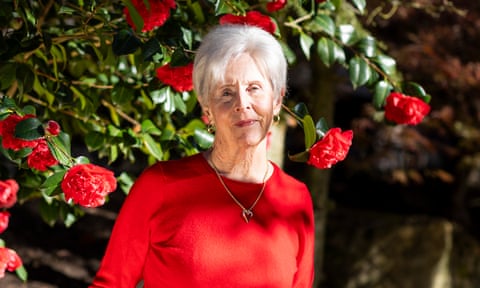At 50, I had a flashback to a priest abusing me as a child. Then I decided to confront him

'I was facing difficult truths – and once you start, you don’t want to stop’ ... Mary Dispenza at home in Washington. Photograph: Annabel Clark, The Guardian
by Anna Moore
Published by The Guardian
Mary Dispenza was almost 50 when she experienced her first flashback. At the time, she was in a workshop entitled Sexual Misconduct on the Part of the Clergy, which she had been asked to attend as part of her job in pastoral support for the Roman Catholic archdiocese in Seattle. To this day, she isn’t sure what words unleashed that memory.
She recalls only how clammy her hands became and how the room suddenly started spinning as she saw her seven-year-old self being lifted on to the lap of a priest in a dark, empty auditorium. She knew in an instant who he was.
Dispenza urgently wanted to leave that workshop, but she sat through to the end. “I didn’t fall apart, I didn’t tell anyone, but it cracked me open and woke me up,” she says. “It was amazing to me that I could really bury that for so long … but that’s what we do to survive.”
Dispenza talks of using two “survival strategies”. At first, she buried the knowledge, hiding it from everyone – including herself – as she built a life at the heart of the Catholic church, even spending 15 years as a nun. She describes it as “splitting” – a dissociation so complete that, even as the horror happened, she could function and move forward without giving it any conscious thought.
After that flashback, Dispenza needed a new strategy. She confronted her abuser, joined a class-action lawsuit against him for damages and has spent decades supporting other victims and campaigning to hold the church accountable for covering up sexual abuse. It is what she calls “a truth telling”, a move into the light.
Dispenza, 84, lives in Washington state, but she grew up in east Los Angeles, where she attended a Catholic school. Her parents weren’t congregants, but they believed it offered their daughter the best education possible. To get her the place, Dispenza’s mother took a job driving the school bus and working in the adjoining rectory.
“The first flashback is a very clear memory,” says Dispenza. “I was seven years old and my mum had driven the bus to school, so I was looking for her at lunchtime. I found her in the lunchroom talking to the lunchroom ladies.” As the women talked, Dispenza grew bored and drifted towards the door, across the hallway and into a dark auditorium where a projector was whirling, emanating a tiny light.
As she made her way towards it, a tall figure in black robes stepped from the shadows – Father George Neville Rucker, the parish priest. “I knew he was a priest, so he was special,” says Dispenza. At the time, in 1947, Rucker was a young man, newly ordained and in his first post, although there were to be many more in the decades ahead, as allegations and rumours led his diocese to continually move him around.
To read the rest of the story, go to The Guardian.
